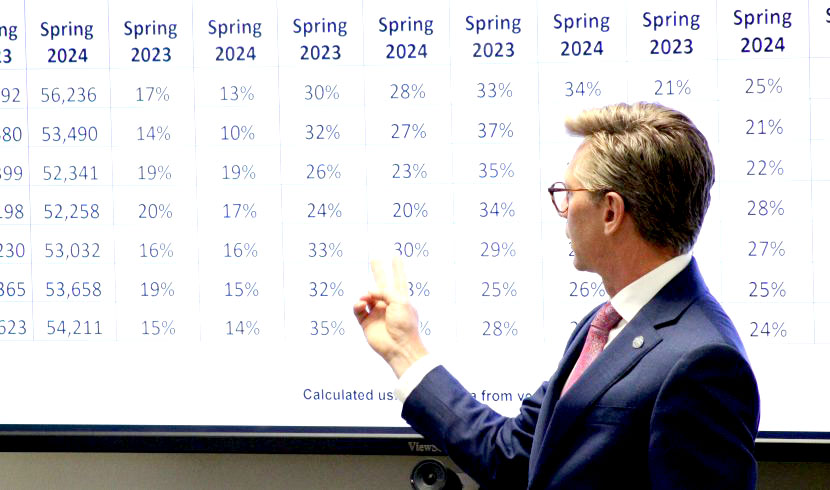By Alexander Willis

MONTGOMERY, Ala. — New test result data reveals some notable regressions in math proficiency among Alabama students, a trend State Superintendent Eric Mackey called “disturbing” and “concerning.”
The new preliminary data revealed state-level test scores for the 2024 Alabama Comprehensive Assessment Program, and was shared by Mackey Tuesday during a meeting of the Alabama State Education Board in Montgomery.
In English language arts, the results generally showed a greater share of students in all grade levels 2 through 8 demonstrating greater proficiency.
The improvements were shared, in part, among fourth graders as well, with 59% of fourth graders demonstrating English proficiency compared to 54% of third graders last year, the same class of students.
“We had increases in every grade, which we’re very happy about,” Mackey said regarding English proficiency test results, of which reading is only a subcategory. “We are above 50% in every grade, and we did better in every grade in proficiency in English language arts, so I feel really good about that overall.”
A greater share of fourth graders, however, scored at the lowest level of English proficiency when compared to their performance last year when in the third grade.
“That’s a trend that we worry about,” Mackey said. “The others seem to have all gone down except for that one trend of third graders and fourth graders.”
Proficiency in any subject is divided into four levels, with levels three and four considered proficient, and levels one and two considered “below basic” and “basic,” respectively, Mackey explained.
Fourth graders were the only class of students to have seen a greater share of students perform at the lowest level of reading proficiency when compared to the previous year.
In math, regressions in students demonstrating proficiency was seen across nearly all grade levels 2 through 8.
Save for fifth and eighth grade students, every grade level saw a smaller share of students demonstrate math proficiency when compared to their performance in 2023 when in the previous grade.
Fourth graders, for instance, saw 39% of students demonstrate math proficiency in the 2024 ACAP, compared to 44% of third graders in 2023, the same class of students, a decline of 5 percentage points year over year.
Seventh graders saw an even greater decline, with 24% demonstrating math proficiency compared to 31% of sixth graders last year.
Additionally, only 5% and 6% of seventh and eighth graders, respectively, demonstrated having the highest level of math proficiency.
“There are two real disturbing trends here; one of them is we don’t want to see any regression, and the other one is when you look at the number of seventh and eighth graders being in level four, (the highest level of proficiency), being in the single digits,” Mackey said.
“That’s very concerning. So it’s telling us also that students are getting a little further behind every year. By the time they get to middle school, we’ve got a small number of students who are at the top end.”
Board members did note, however, the dramatic improvements in English proficiency among third graders, something Mackey said he attributed “almost all of that” to Alabama Reading Initiative teacher coaches and student interventionists.
The Alabama Legislature included as part of its $9.3 billion education budget $5 million for auxiliary teachers to help struggling readers up to the third grade, a part of Alabama’s statewide initiative to improve literacy skills.
Efforts to improve literacy have increased in recent years in anticipation of the Literacy Act going into full effect, which now requires third graders to demonstrate reading proficiency to advance to the fourth grade.
As the language in the state’s education budget dictates ARI coaches and interventionists may only work with teachers and students up to the third grade, both board members Tracie West and Tonya Chestnut raised the idea of seeking a change in the law to allow students beyond the third grade to receive similar assistance.
“Yes, those are things we should look at I think,” Mackey said.
After the meeting, West expanded on her support for allowing ARI coaches and interventionists to work with teachers and students beyond the third grade, calling it a “common sense” approach to improving English proficiency.
“I would really like to work closely with the Legislature in providing data and information to them so that they could understand more fully, if we were able to expand the coaching that ARI is providing to those upper grades, (how) I think that we will prepare those students better,” West told Alabama Daily News.
Chestnut suggested that the Alabama Education Department may be able to utilize ARI coaches and interventionists for grades beyond the third sooner, using the $5 million already allocated for struggling readers to expand ARI services.
“Possibly (we) could utilize the funds that have already been earmarked for the other grades and work toward providing that support,” she told ADN. “Having the coaches in the upper grades would definitely be beneficial, but it would also just as beneficial to have an interventionist work directly with the children that need that additional support.”











